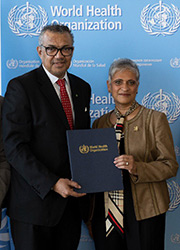

College signs landmark agreement with WHO
When you can’t afford to live, life becomes a living nightmare. It hangs over you. The missed payments and demand letters that lay unopened; the worry that gets bigger every passing day.
As the cost-of-living crisis continues, more of our patients are experiencing this. Government support in recent months may have taken the edge off, but whilst some support for vulnerable groups will continue, monthly energy payment reductions are ending, and food prices remain high.

There is a clear link between rising cost-of-living and poor mental health. Then there are also the less direct, physical health consequences of the little changes people may make to cope with their financial situation: not turning the heating on; switching to processed, pre-prepared meals that are fast, easy and cheap.
Our emergency appointments are full of wheezy children, who use inhalers because of poor symptom control. Their parents do their best but are struggling to afford to heat their home, and what can they do if they live next to a busy road in one of our polluted cities?
Some people self-medicate. We see first the acute gastritis, then pancreatitis, eventual liver disease and brain damage, from addiction to alcohol, not to mention its wider social effects.
That high blood pressure that we find and treat and pat ourselves on the back for fixing. But what we may miss – and are not paid for - is the underlying reason: the slow atherosclerotic build-up following sustained stress, inactivity and comfort eating.
I could go on.
People who work in primary care – whether GPs, nurses or reception staff - connect with people and work with them to make meaningful changes: every GP can think of a patient who they have helped understand the consequences of their diabetes and dramatically improved their control – all it takes is the right motivation and the right click with the right professional.

But what can we do to deal with the source of many of the health problems we see? And is it our place, at all? I’d argue it is.
Estimates suggest that every £1 spent on warming up the homes of vulnerable households can lead to £4 in health benefits.
Investing in well-built, well-maintained and well-insulated homes that won’t get damp, and cost hardly anything to heat, would make a world of difference to the long-term health of our patients. The most efficient may even have heat recovery and filtration systems that eradicate indoor pollution and allergens. This investment would create spaces that people can live in safely and healthily – and save money for the NHS in the long run.
Incentivising cycling, walking and public transport – and disincentivising driving – would also have a big impact. Switch to the former, and you have exercise, fresh air and (hopefully) green space built into your routine. You are happier, fitter and healthier - again the NHS benefits.
These examples would cost a lot of money and require wider societal motivation, and opinion is divided about how we get there, but the long-term benefits for patients’ health, the NHS and - to speak to a particular interest of mine: sustainability - the planet, would be plentiful.
We see things in our consulting rooms that require immediate action. But the underlying causes need action too – sometimes on an individual level, sometimes a societal one. Many of my motivated GP colleagues see activism as a route to change, while some resort to health politics or research. As GPs, we have a powerful voice. One that is not only listened to by our patients, but those in power in our communities, and more widely too. It’s important we use it.
Dr James Morton is a GP in Glasgow and RCGP Scotland’s joint Clinician Representative for Climate and Sustainability
Read more

Thank you for your feedback. Your response will help improve this page.


